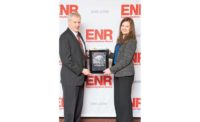ENR Midwest Designer of the Year: Burns & McDonnell










In a more lighthearted flick entitled "I Wanna Work At Burns & Mac," a pair of employees sing "I want to work at Burns & Mac so friggin' bad, a job at anywhere else would make me sad. I wanna be on the cover of ENR magazine, smiling next to Greg Graves fist-bumping," in the style of a hip-hop music video.
Once on board, new hires enroll in a mentoring program that pairs each with a seasoned employee assigned to assist the new hire in honing designated skills. Also, Burns & McDonnell University assists employees in developing their business and technical skills. "Some of the course work involves project management training, technical training, systems training, but we also offer employees the opportunity to improve their business development and marketing skills," says Washam. To enhance client interaction, some programs place particular emphasis on presentation and persuasive skills. Employee efforts are frequently filmed and critiqued.
Employees soon learn that operating divisions are porous. "We really don't have boundaries," says Washam. "Depending on employee interest or division workload, employees may transfer from process and industrial to energy and back."
Geography also poses no boundaries. "I'm a good example of that," says Newland, who ricocheted between Virginia, New England and Kansas City before settling into his post in Chicago. "Sometimes an employee may move for three months or six months to address a small issue on a larger project," he says. "It's all a matter of our groups working together to get the right expertise in front of the right client."
Current client initiatives are driving innovation across several sectors, with the firm's St. Louis office placing special emphasis on renewable refining. "Sure, we do work for utilities like Ameren, but we also see room for growth and advancement with firms like Monsanto," says Washam. "We see particular potential to replace a number of petroleum-based fuels and chemicals with cellulosic ethanol, in this case cellulosic ethanol derived from poplar trees."
In April, its work on a demonstration-scale biorefinery in Oregon that produces advanced ethanol, fuels and chemicals from non-food cellulosic feedstocks earned Burns & McDonnell the 2012 Grand Conceptor Award from the American Council of Engineering Companies' Missouri Chapter. A duel honoree, the firm also was recognized for its engineering of Kansas City Power and Light's Iatan Generation Station Unit 2, regarded as one of the cleanest and most efficient supercritical coal-fired power facilities in North America.
"Those types of innovations are all about communication," says Newland, "beginning with when the client expresses a need."






